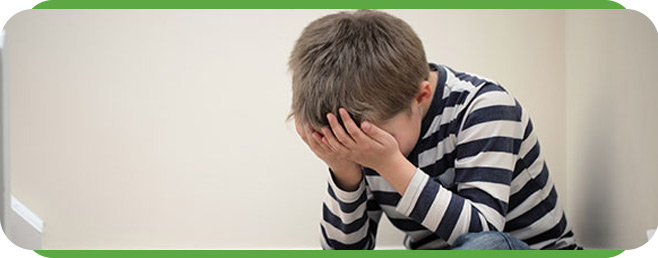Anxiety, Teeth Grinding and Sleep Apnea in Children
What’s the Connection? Does Your Child Have a Habit Of Grinding Teeth in Sleep? Well, It Can Have a Deep Rooted Link With Anxiety But Don’t Worry! Our Sleep Doctors at Koala® Center For Sleep & TMJ Disorders Can Provide a Solution. Call Us For More Information or Schedule Your Appointment With Us Online.


What should parents do if their child’s sleep worsens over time?
For parents of young children, the dream of a good night’s sleep is often just that, a dream. But what happens when the years pass and your child’s sleep worsens? This unfortunate reality is one that many families are living through nightly. What should be a calm and peaceful sleep is instead fitful, interrupted and noisy. It’s an unsettling sound few could miss, and it should be a wake-up call to parents that something isn’t right.
What is teeth grinding (bruxism), and how is it related to obstructive sleep apnea?
Teeth grinding, or bruxism, occurs when you grind your teeth together or clench your jaw, and it can lead to damaged teeth, muscle pain, headaches and problems with the temporomandibular joints (TMJ Disorders). It is surprisingly common, occurring in up to 40% of children and adolescents (Journal of Dentofacial Anomalies and Orthodontics). While the exact cause is unknown, teeth grinding appears to be strongly linked to another sleep disorder, Obstructive Sleep Apnea, and both conditions lead to an increased risk for anxiety and depression in children and adolescents. The good news is that there is hope for a better night’s sleep!
How are sleep problems, anxiety, and teeth grinding related in children and adolescents?
Current evidence suggests that the time between childhood and adolescence is often characterized by increased sleep problems and anxiety (Current Opinion in Psychiatry). Children are not getting enough sleep, and the sleep they are getting is more disrupted. Poor sleep and increased anxiety often go hand-in-hand. The National Sleep Foundation (NSF) notes that even mild sleep deprivation over an extended time can impact mood, leaving you more irritable and even causing symptoms of clinical depression. Interestingly, teeth grinding is often seen in children who are experiencing higher levels of stress or anxiety. It could be something as simple as worrying about a grade or a big game.
How is (bruxism) related to Obstructive Sleep Apnea (OSA) in children and adolescents?
While linked with stress and anxiety, the exact cause of teeth grinding is unknown. However, recent research suggests a strong link to another sleep disorder: Obstructive Sleep Apnea (OSA). OSA occurs when the throat muscles relax during sleep, the airway becomes blocked and breathing stops. This can occur over and over throughout the night. According to the NSF, nearly one in four people with OSA grind their teeth during sleep. One explanation for this correlation is that teeth grinding plays a protective role against upper airway obstruction. The idea is that when the airway is blocked, your body causes your teeth to grind, thus reopening the airway (Journal of Dentofacial Anomalies and Orthodontics).
How is teeth grinding (bruxism) connected to Obstructive Sleep Apnea (OSA)?
While problems like sleep apnea are fairly well-known in adults, we are seeing an increase in Sleep-Related Breathing Disorder (SRBD) in children and adolescents as well. Sleep-Related Breathing Disorder results in fragmented sleep due to a compromised airway interrupting sleep, hormone production/regulation, jaw development and daytime performance. When a child’s airway is narrow, underdeveloped, or constricted in any way, the child can struggle to get enough oxygen during sleep, leading to serious health, learning and behavior issues. Children with SRBD may grind their teeth, snore, or gasp for air during sleep. In addition, they may show signs of daytime sleepiness, increased anxiety, behavioral problems, and decreased focus. If left untreated, both teeth grinding and SRBD can lead to long-term problems, including increased anxiety, tooth wear and Obstructive Sleep Apnea.
How can KoalaKIDZzz® help children with sleep-related breathing disorders (SRBD) and teeth grinding?
At KoalaKIDZzz®, a division of Koala® Center For Sleep & TMJ Disorders, we treat children from toddlers to teens that suffer from symptoms related to SRBD. With oral appliance therapy, we provide a non-invasive, non-prescription treatment that results in proper airway development, guided growth for the jaws and a better night’s sleep. As the jaw grows properly, it improves the profile and enlarges the airway, encouraging nasal breathing while addressing the root cause of SRBD. In addition, the appliance helps to prevent the tooth damage associated with bruxism. With better sleep, children may experience decreased stress and anxiety, better grade performance, and behavioral improvements at home and in school.
If your child is showing signs of poor sleep, increased anxiety or teeth grinding, consider visiting Koala® Center For Sleep & TMJ Disorders. Our doctors are trained to treat SRBD with Oral Appliance Therapy. Please contact us today or visit us online to book an appointment. We have convenient locations across the U.S. in Bloomington IL, Peoria/Dunlap IL, El Paso TX and Wausau WI.

Additional Services You May Need
▸ KoalaKIDZzz®
▸ Sleep Apnea
▸ Snoring
▸ TMJ Disorder
▸ Fatigue
▸ Sleep Disorders
▸ Weight Loss
▸ CPAP Alternative
▸ Oral Appliances




